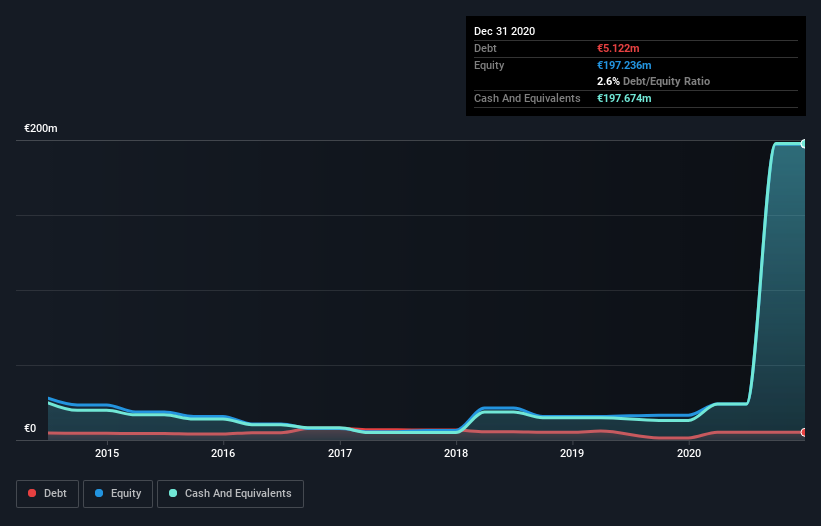
Howard Marks put it nicely when he said that, rather than worrying about share price volatility, 'The possibility of permanent loss is the risk I worry about... and every practical investor I know worries about.' So it seems the smart money knows that debt - which is usually involved in bankruptcies - is a very important factor, when you assess how risky a company is. We can see that McPhy Energy S.A. (EPA:MCPHY) does use debt in its business. But should shareholders be worried about its use of debt?
Why Does Debt Bring Risk?
Generally speaking, debt only becomes a real problem when a company can't easily pay it off, either by raising capital or with its own cash flow. If things get really bad, the lenders can take control of the business. However, a more common (but still painful) scenario is that it has to raise new equity capital at a low price, thus permanently diluting shareholders. Of course, debt can be an important tool in businesses, particularly capital heavy businesses. The first thing to do when considering how much debt a business uses is to look at its cash and debt together.
View our latest analysis for McPhy Energy
What Is McPhy Energy's Debt?
You can click the graphic below for the historical numbers, but it shows that as of December 2020 McPhy Energy had €5.12m of debt, an increase on €1.39m, over one year. But on the other hand it also has €197.7m in cash, leading to a €192.6m net cash position.

A Look At McPhy Energy's Liabilities
We can see from the most recent balance sheet that McPhy Energy had liabilities of €18.6m falling due within a year, and liabilities of €4.29m due beyond that. Offsetting this, it had €197.7m in cash and €12.6m in receivables that were due within 12 months. So it can boast €187.4m more liquid assets than total liabilities.
This surplus suggests that McPhy Energy is using debt in a way that is appears to be both safe and conservative. Due to its strong net asset position, it is not likely to face issues with its lenders. Succinctly put, McPhy Energy boasts net cash, so it's fair to say it does not have a heavy debt load! When analysing debt levels, the balance sheet is the obvious place to start. But it is future earnings, more than anything, that will determine McPhy Energy's ability to maintain a healthy balance sheet going forward. So if you want to see what the professionals think, you might find this free report on analyst profit forecasts to be interesting.
In the last year McPhy Energy wasn't profitable at an EBIT level, but managed to grow its revenue by 20%, to €14m. Shareholders probably have their fingers crossed that it can grow its way to profits.
So How Risky Is McPhy Energy?
Statistically speaking companies that lose money are riskier than those that make money. And in the last year McPhy Energy had an earnings before interest and tax (EBIT) loss, truth be told. And over the same period it saw negative free cash outflow of €7.8m and booked a €9.3m accounting loss. But at least it has €192.6m on the balance sheet to spend on growth, near-term. With very solid revenue growth in the last year, McPhy Energy may be on a path to profitability. By investing before those profits, shareholders take on more risk in the hope of bigger rewards. The balance sheet is clearly the area to focus on when you are analysing debt. However, not all investment risk resides within the balance sheet - far from it. These risks can be hard to spot. Every company has them, and we've spotted 3 warning signs for McPhy Energy (of which 1 doesn't sit too well with us!) you should know about.
If, after all that, you're more interested in a fast growing company with a rock-solid balance sheet, then check out our list of net cash growth stocks without delay.
When trading McPhy Energy or any other investment, use the platform considered by many to be the Professional's Gateway to the Worlds Market, Interactive Brokers. You get the lowest-cost* trading on stocks, options, futures, forex, bonds and funds worldwide from a single integrated account. Promoted
If you're looking to trade McPhy Energy, open an account with the lowest-cost platform trusted by professionals, Interactive Brokers.
With clients in over 200 countries and territories, and access to 160 markets, IBKR lets you trade stocks, options, futures, forex, bonds and funds from a single integrated account.
Enjoy no hidden fees, no account minimums, and FX conversion rates as low as 0.03%, far better than what most brokers offer.
Sponsored ContentNew: Manage All Your Stock Portfolios in One Place
We've created the ultimate portfolio companion for stock investors, and it's free.
• Connect an unlimited number of Portfolios and see your total in one currency
• Be alerted to new Warning Signs or Risks via email or mobile
• Track the Fair Value of your stocks
This article by Simply Wall St is general in nature. It does not constitute a recommendation to buy or sell any stock, and does not take account of your objectives, or your financial situation. We aim to bring you long-term focused analysis driven by fundamental data. Note that our analysis may not factor in the latest price-sensitive company announcements or qualitative material. Simply Wall St has no position in any stocks mentioned.
*Interactive Brokers Rated Lowest Cost Broker by StockBrokers.com Annual Online Review 2020
Have feedback on this article? Concerned about the content? Get in touch with us directly. Alternatively, email editorial-team (at) simplywallst.com.
About ENXTPA:ALMCP
McPhy Energy
Provides hydrogen production and distribution equipment for hydrogen energy, hydrogen mobility, and industrial hydrogen markets.
Slight with mediocre balance sheet.
Similar Companies
Market Insights
Community Narratives



